Return to Marshall Space Flight Center
V-2
The Marshall Rocket Garden hosts a German A4/V-2 missile.
According to a 2004 HABS/HAER historical assessment of the Rocket Garden which I received in a private email
The V-2 is a 46-foot rocket designed and engineered at the Nazi Germany experimental rocket test site of Peenemünde during World War II. Originally known as an A4 rocket, the V-2 features a body diameter of 5 feet 5 inches, an empty weight (with warhead) of 8,818 pounds, and a take-off weight of 28,440 pounds. Its payload capability was about 2,200 pounds. The V-2’s liquid fuel system included alcohol, oxygen, and hydrogen-peroxide tanks. The rocket could achieve an apogee of 50 to 56 miles, with a range of just under 200 miles. Germany launched the first operational V-2s against London in September 1944—two years after testing had begun at Peenemünde. Captured V-2 materiel began arriving at Fort Bliss, Texas, in August 1945, launched with test payloads at the White Sands Proving Ground into 1949. The United States Army, and subsequently the United States Air Force, used reassembled V-2s to support its early upper air research. The military agencies launched more than 60 V-2s at White Sands.
NASA equipment records give a manufacturing date for the rocket of 1943. It is undetermined if the V-2 is a “shell” of the historic rocket, or if the rocket contains its historic internal working parts. Photographs verify that the V-2 was part of Rocket Park [sic] by July 1963.
The fins on this V-2 are substantially different from that of a "normal" V-2. The fins do seem to be similar to those on a Hermes II (about half-way down the page). Also see The Hermes II Incident and this page of Hermes II photos.
However, me pointing out the similarities is merely an observation and I have no specific knowledge of this V-2's heritage (other than what is in the HABS/HAER historical assessment).
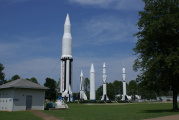 dsc84905.jpg |
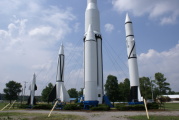 dsc67281.jpg |
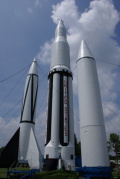 dsc67100.jpg |
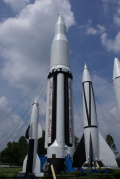 dsc67104.jpg |
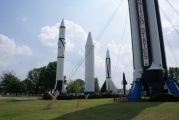 dsc67289.jpg |
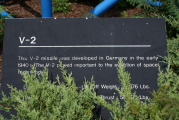 dsc84934.jpg |
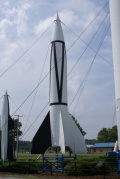 dsc67274.jpg |
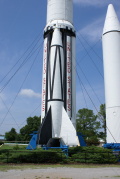 dsc84969.jpg |
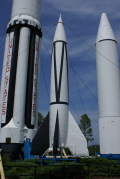 dsc84923.jpg |
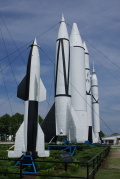 dsc84974.jpg |
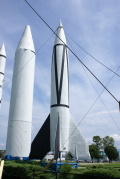 dsc84977.jpg |
Return to Marshall Space Flight Center